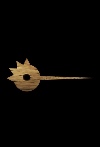Pinocchio opens as a poor but honest and compassionate carpenter, Geppetto (Roberto Benigni), scrapes the inner soft part of some wood for a bite of sustenance. His idealistic character is developed quickly as we observe his joy surrounding a new idea to carve a puppet he will take around the world, creating a lucrative puppet show. Coincidentally, he is given a magic piece of wood which soon astonishes Geppetto when it comes alive. He names his new ‘son’ Pinocchio (Federico Ielapi), and although Geppetto would suffer anything for the little puppet, Pinocchio is ungrateful and runs away. When he returns, his blatant refusal to listen to good advice spurs him to injure Cricket (Davide Marotta) who offers an unappreciated voice of warning.
Geppetto wants his little son to be educated and sacrifices his coat for a school book, but Pinocchio and his heart of wood sell it back for four gold coins to watch a traveling puppet show. He is spotted and nabbed by Mangiafuoco (GiGi Proietti), the cruel owner, but appeals to his heart with the sad story of Geppetto. A touched and kinder Mangiafuoco releases Pinocchio, giving him five gold coins to bring back to his impoverished father.
The rest of the story is a journey of consequences for Pinocchio as his unwise choices are fueled by a lazy work ethic and desire for fun and immediate gratification. He is twice fooled by Fox (Massimo Ceccherini) and Cat (Rocco Papaleo) who want only to get to Pinocchio’s gold coins which he secures in his mouth. Dressed as assassins, Fox and Cat frantically hunt down Pinocchio, hanging him, in hopes the coins will fall. But there’s a dead, yes– dead, beautiful fairy (Marine Vacti) who has different plans and transfers the peaked puppet to the house of the dead. She and Snail (Maria Pia Timo), who is also dead, revive Pinocchio back to health.
Finally, we witness Pinocchio’s famous protrusion almost putting out the eye of Fairy as he lets little lies cascade past his wooden lips. This is the only time we see this nose of notoriety grow, which differs from the original story. Interestingly, when he lies to a judge (Tico Chio), claiming guilt, his nose stays put. He’s on to find his father and suffers more misadventures with more ghastly characters. It is only when he professes responsibility and a good work ethic that his journey leads him to work for a kind sheep farmer, who lacks any of the unsettling animal features or gargoyle eyes. Pinocchio is finally able to show maturity and responsibility and is changed into a little boy by Fairy.
I viewed the captioned version since it was filmed in Italian, and found Pinocchio to be a film all about artistic expression from every aspect of filmmaking. Yet there’s a prevalent darkness that hangs over the story. Forget the children’s book, although it provides a place for the artists to work. The acting is absolutely mesmerizing. Highly skilled theater actors consistently display their work ‘outside the box’. In harmony with the director (I assume), many have a free-for-all, choosing different features of insanity to mold his or her character. I think Snail and Fox would vie for first in the ‘I Am Nuts contest’.
The performances seek an older audience, certainly not small children, for reasons above, and since there are some disturbing visuals such as Pinocchio hanging, and after being morphed into a donkey, being tossed with a rock around his neck into the sea. Wardrobe, make-up, sets, sound and foley, cinematography all are over the top. The Italian locations are crucial to the film’s look and feel. Sets are precisely detailed, down to the fine, luminescent dust occupying corners in the house of the dead. Pinocchio’s make-up adds truth to the character, yet is somewhat disturbing in its own way, looking a little like one of those mannequins in an Anatomy class displaying the vascular system. Not cute, warm or fuzzy. Again, not for small children. Lesson-wise, the film concentrates on teaching responsibility and isn’t that much about the value of truth and honesty. Dove awards Pinocchio with the 12+ years Seal of Approval.
The Dove Take:
This Italian filmed, adapted story of Pinocchio, is presented through the lens of the grotesque. The film boasts superior acting, ultra-detailed costuming and make-up, but delivers an experience too dark for small children.





